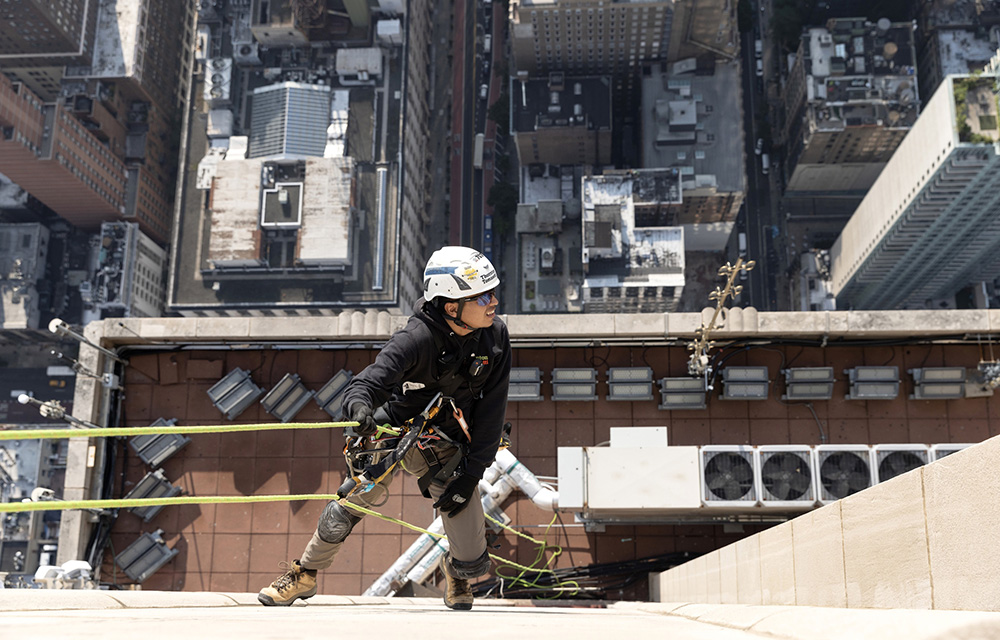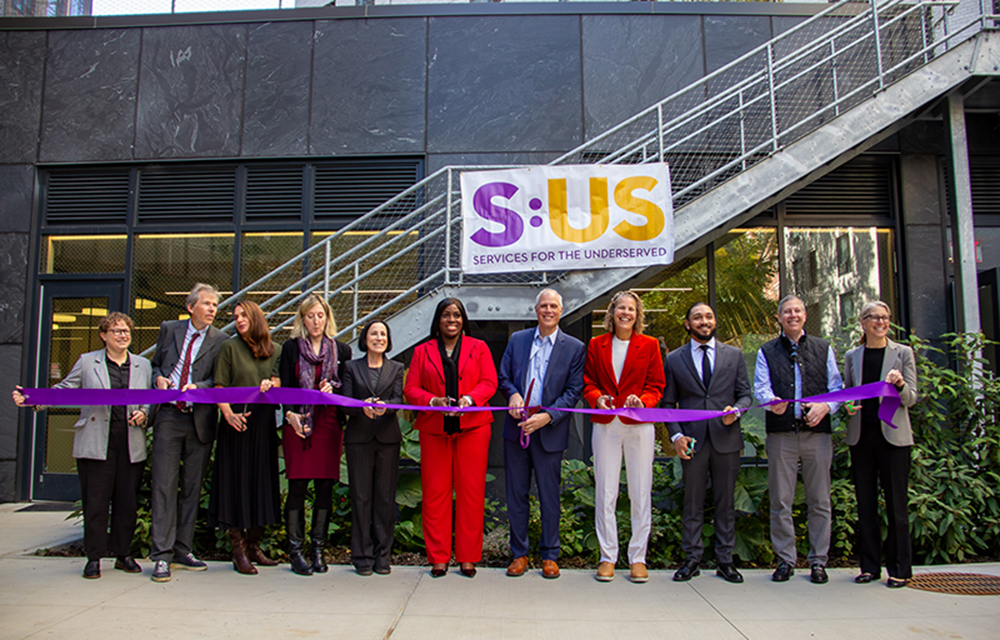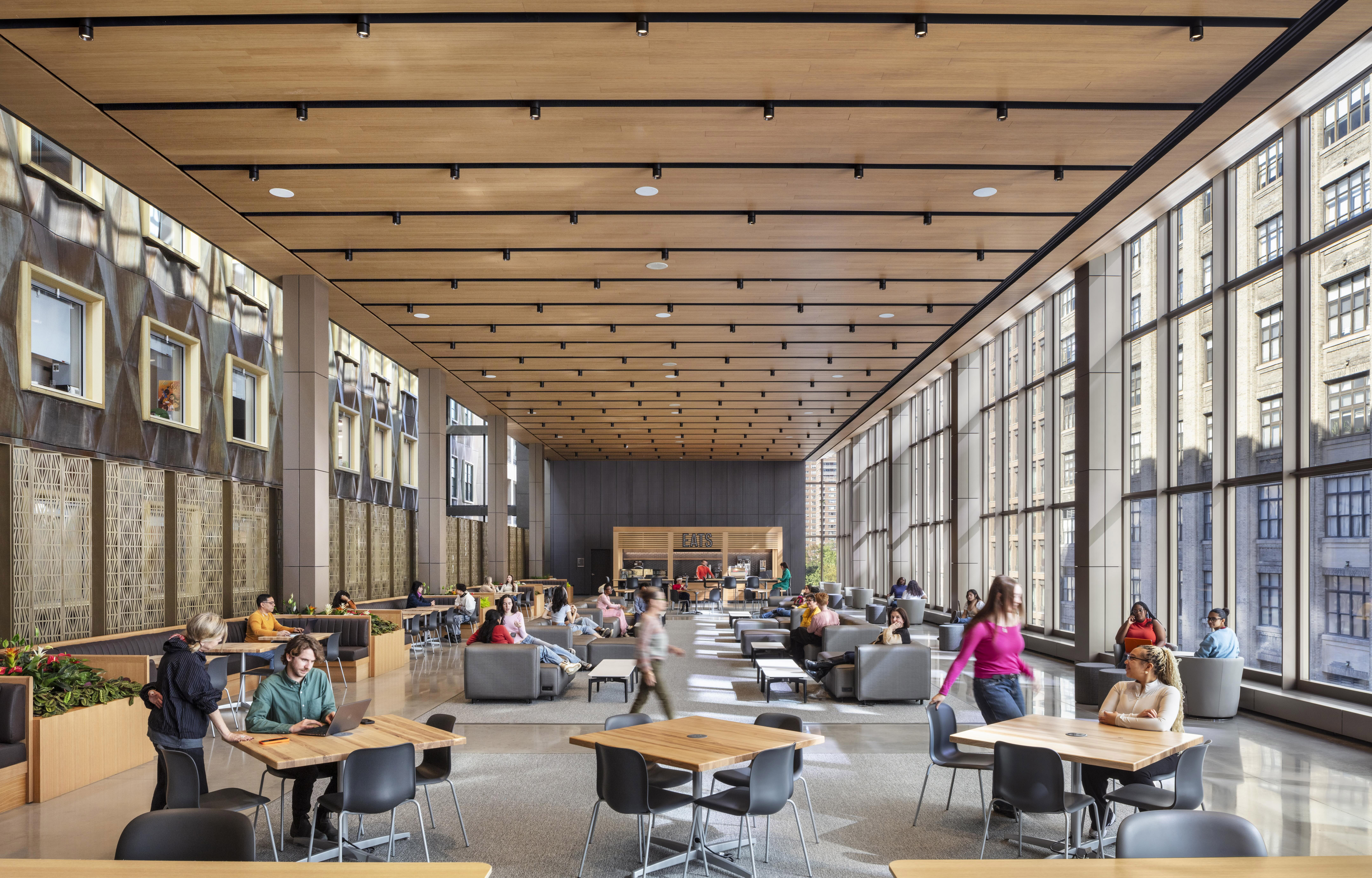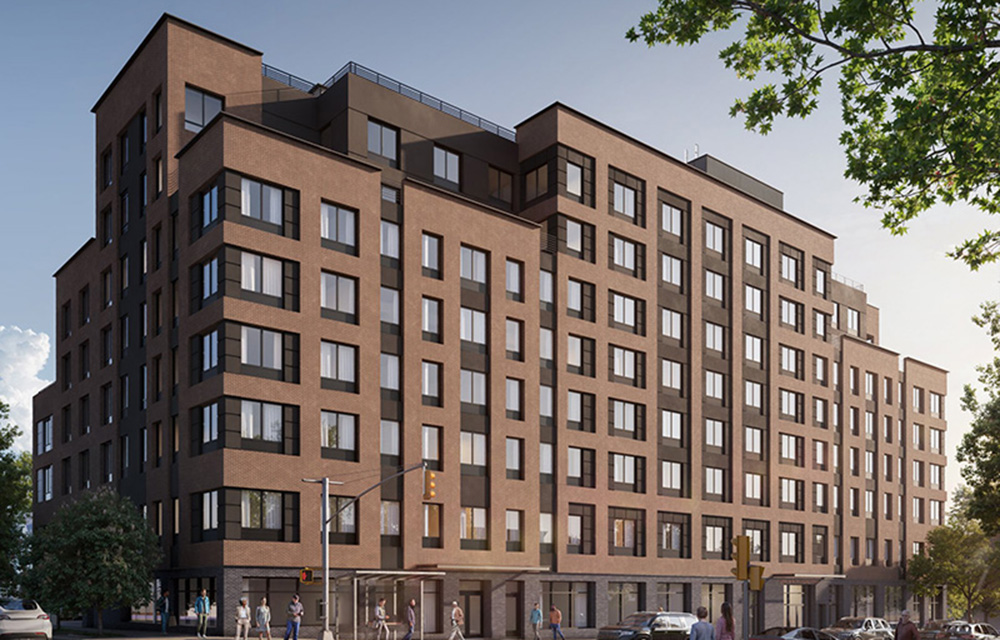Gov. Cuomo awards $13m in second round of NYSERDA’s Buildings of Excellence
Albany, NY According to governor Andrew Cuomo, $13 million has been awarded to 14 projects through the second round of NYSERDA’s Buildings of Excellence competition recognizing the design, construction and operation of low-carbon or carbon neutral multifamily buildings. With these winners, which include a diverse mix of large, small and community not-for-profit developers, the $40 million competition has provided awards for the construction of over three dozen new construction and gut-renovation projects through the competition, including over 4,200 units that will serve low- to moderate-income households. The competition supports governor Cuomo’s nation-leading clean energy and climate goals, including the goal to reduce greenhouse gas emissions 85% by 2050 as mandated in the Climate Leadership and Community Protection Act.
Lieutenant governor Kathy Hochul celebrated at a virtual awards ceremony.
“New York has shown that it can successfully construct low or zero carbon emitting buildings to combat the existential threat of climate change, and the Buildings of Excellence competition puts the state’s money where its mouth is,” governor Cuomo said. “The 14 projects receiving awards will help us provide good-quality, comfortable, healthy and affordable housing for our most vulnerable residents while providing a blueprint for building owners to shrink their carbon footprints. New York has set nation-leading goals to reduce carbon emissions and protect the environment, and this competition adds to our state’s ongoing efforts on all fronts to achieve that.”
“Our innovative Buildings of Excellence competition is yet another way New York is taking bold action against the threat of climate change,” Lt. governor Hochul said. “Not only do these forward-thinking designs set the standard for carbon neutrality, they directly serve our most vulnerable populations. This is how we create a cleaner, greener and more inclusive post-pandemic future for New Yorkers.”
Highlights include:
- Affordable Housing: 78% of the units to be constructed will serve low- to moderate-income customers, an increase from 68% in Round One;
- First All-Electric Skyscraper: The first super tall high-rise in the competition’s history, the 45-story, highly-efficient, all-electric Court Sq. project in Long Island City, Queens will demonstrate significant success and advancement in carbon neutral design for one of the most challenging of building styles;
- Predictable Utility Costs: At least five projects include an “all in” rental model, where residents have stable rent and utility costs;
- Carbon Neutral Performance: 100% of projects are carbon neutral, meaning they are highly efficient, all-electric with no use of fossil fuel combustion on site for daily operations; and
- Cost Compression and Increased Resiliency: Average construction costs have decreased while use of materials with lower embodied carbon and climate resiliency building features like shading, back-up power and flood mitigation have increased.
Five of the awarded projects were recognized by the Architectural League of New York with a ‘Blue Ribbon for Design Excellence’ for aesthetics, function, sustainability, and for proving that carbon neutral designs can exhibit beauty, function and esteemed connection to their community. Blue Ribbon honorees were selected by an independent panel of highly accomplished architects, including: Victor Body-Lawson, Body-Lawson Associates Architects and Planners; Ruchika Modi, PAU: Practice for Architecture and Urbanism; Florian Idenburg, SO-IL; Andrew Bernheimer, Bernheimer Architecture; and Illya Azaroff, +Lab and Professor NYC College of Technology.
Winners were required to demonstrate cost-effective, low-carbon or carbon-neutral designs that are profitable for developers, offer predictable revenue and costs, and provide a competitive edge while simultaneously creating a comfortable, healthy, and affordable space for building occupants. The winning projects will also provide comprehensive data on design, construction and cost that can be analyzed and shared to increase the number of low- to zero-carbon buildings in New York State. The third round of the competition will be launched in late 2021.
NYSERDA president and CEO Doreen Harris said, “Addressing harmful carbon emission in our building sector is a cornerstone of Governor Cuomo’s nation-leading climate plan and these winning projects demonstrate tremendous progress in low-carbon building design that sets a new standard for environmentally-friendly construction and operation. Working with our industry partners to develop turn key low-carbon solutions and designs moves us one step closer to achieving the State’s clean energy goals and we congratulate all of today’s winners for their exemplary proposals.”
The 14 winning Round Two projects are located in the following Regional Economic Development Regions:
- Capital Region: Three projects, $2.75 million
- Finger Lakes: One project, $1 million
- Mid-Hudson: One project, $1 million
- Mohawk Valley: Two projects, $2 million
- New York City: Six projects, $5.8 million
- Western New York: One project, $363,000
Launched in 2019, this competition is the only one of its kind in the U.S. and provides financial incentives and recognition for the design, construction, and operation of resilient low- or zero-carbon emitting buildings. The competition is administered by the New York State Energy Research and Development Authority with the support of an advisory council comprised of industry experts.
For the complete list of all Buildings of Excellence awarded projects, please visit NYSERDA’s website.
New York State Homes and Community Renewal commissioner RuthAnne Visnauskas said, “Governor Cuomo’s ambitious Climate Leadership and Community Protection Act has set us on a path to carbon neutrality by creating and preserving low-carbon, energy efficient affordable housing in communities across the state. NYSERDA’s Buildings of Excellence competition is critical to this effort with $13 million awarded in the competition’s second round. I am very pleased to see that 78 percent of the apartments in the 14 winning buildings are affordable for low- and moderate-income New Yorkers. On behalf of the HCR team, congratulations to these developers and architects for helping us secure a better, cleaner and sustainable future.”
Senator Kevin Parker, chair of the NYS Senate Energy and Telecommunications Committee, said, “I want to congratulate the winners of this round of the Buildings of Excellence Awards and NYSERDA for leading the way as we reduce carbon emission in our states building sector. This is another example of how we can achieve our clean energy and climate mitigation goals through buildings that result in lower and zero emissions and deliver benefits to affordable housing.”
New York State Assembly energy chair Michael Cusick said, “Reducing carbon emissions across the board is one of the most crucial components of our statewide effort to achieve the emissions and energy standards set forth by the CLCPA. Buildings are among the most significant contributors to overall carbon emissions and the projects recognized today demonstrate the potential for buildings across the state to limit and eliminate their carbon footprint. I congratulate today’s winners for the valuable contribution they are making to our state’s efforts and the example they are setting.”
Rosalie Genevro, executive director, Architectural League of New York said, “Creating low-carbon and carbon-neutral resilient homes for New Yorkers is critical to our future, and NYSERDA’s Buildings of Excellence program is providing essential support for that effort. The Architectural League is honored to work with NYSERDA to intensify the focus on overall design quality as an important criterion for evaluation of Buildings of Excellence projects.”
2020-21 ASHARAE president Charles E. Gulledge III, P.E., said, “Developing strategies to reduce building climate change footprints, maintain resilience and advance energy efficiency goals, exemplify ASHRAE’s core sustainability commitments. NYSERDA’s Buildings of Excellence competition reveals the multiple opportunities for widescale utilization of advanced technologies that will benefit the built environment and enhance occupant experiences. We are delighted that NYSERDA is tackling these challenges.”
AIA New York State 2021 president Illya Azaroff, FAIA, said, “The projects recognized and awarded through the Buildings of Excellence program represent the cutting edge of high performance, environmentally conscious design and serve as a examples for all architects to aspire. Showing the way forward through tangible artifacts that meet the challenges of climate change is the hallmark of this program,”
Unique People Services executive director and CEO Yvette Brissett-André, MPA, said, “At Unique People Services we understand the various social determinates that can determine one’s life expectancy and health-- so throughout the design and creation of 2050 Grand Concourse, we intentionally focused on features that would allow us to deliver quality health services and provide safe housing that will last for generations. We thank NYSERDA for their partnership through the Buildings of Excellence award and other incentives that provided us with upfront construction capital to ensure our sustainable design features such as all LED lighting, green roof trays remained intact and delivered improved health outcomes for our individuals, staff and the greater Bronx community.”
Building Energy Exchange executive director Richard Yancey said, “Congratulations to the fourteen Buildings of Excellence Round Two winning teams, whose projects have demonstrated inspiring creativity charting the roadmap to normalize high performance, healthy buildings for all communities. We are thrilled to be able to showcase these innovative and profitable solutions, through our BE-Ex exhibits and programs, broadly sharing the lessons-learned with the entire real estate sector, and demonstrating New York’s leadership in decarbonizing our built environment.”
Buildings are one of the most significant sources of greenhouse gas emissions in New York State and through NYSERDA and utility programs, over $6.8 billion is being invested to decarbonize buildings across the State. By improving energy efficiency in buildings and advancing statewide installations of onsite storage, renewables, and electric vehicle charging equipment, the State will reduce its carbon pollution and achieve the State’s ambitious target of reducing on-site energy consumption by 185 trillion BTUs by 2025, the equivalent of powering 1.8 million homes. The State’s ambitious plan to reduce carbon pollution will result in an additional $1.8 billion in societal and environmental benefits.
Funding for this program is through the State Clean Energy Fund and is part of NYSERDA’s more than $165 million investment in new construction and gut rehab projects in the multi-family building sector including market rate and low- to moderate-income. More information about this competition, and the funding available through it, can be found on NYSERDA’s website.
New York State’s Nation-Leading Climate Plan
Governor Cuomo’s nation-leading climate agenda is the most aggressive climate and clean energy initiative in the nation, calling for an orderly and just transition to clean energy that creates jobs and continues fostering a green economy as New York State recovers from the COVID-19 pandemic. Enshrined into law through the Climate Leadership and Community Protection Act, New York is on a path to achieving its mandated goal of a zero-emission electricity sector by 2040, including 70 percent renewable energy generation by 2030, and to reach economy wide carbon neutrality. It builds on New York’s unprecedented ramp-up of clean energy including over $4 billion invested in 91 large-scale renewable projects across the state, supporting more than 150,000 jobs in New York’s clean energy sector in 2019, a commitment to develop 9,000 megawatts of offshore wind by 2035, and 1,800 percent growth in the distributed solar sector since 2011. Under Governor Cuomo’s leadership, New York will build on this progress and reduce greenhouse gas emissions by 85 percent from 1990 levels by 2050, while ensuring that at least 35 percent with a goal of 40 percent of the benefits of clean energy investments to disadvantaged communities and advancing progress towards the state’s 2025 energy efficiency target of reducing on-site energy consumption by 185 trillion BTUs of end-use energy savings.
NYC mayor and DOB release comprehensive façade inspection and safety study conducted by Thornton Tomasetti








.gif)
.jpg)

.gif)